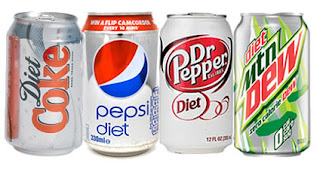HOW SAFE ARE DIET DRINKS?
Good question, considering more people are getting weight-conscious and seeking to cut calories. With the increasing campaign against indulging in soda, a lot of people are becoming aware of the risks associated with such indulgence ranging from weight gain to increased risk for diseases like hypertension, diabetes, obesity, bone and dental diseases, and the depression associated with some of these diseases. It is no surprise therefore that calory-free alternatives became almost instantly appealing. These alternatives replaced sugar, which is the major culprit with these diseases.Sweeteners are chemical substances that are used as substitutes to sugar and either release no calories, or produce calories that are not absorbed by the body (although, linguistically, sugar is a sweetener too, but, for the purpose of this essay we will continue with sugar versus sweeteners). Basically, there are four classes of sweeteners:
The non-nutritive sweeteners, like aspartame and saccharin, which are chemically compounded. They are the most commonly used.
The sugar alcohols, like sorbitol and zylitol, are reduced-calory sweeteners derived from vegetables and fruits, or by hydrogenation of sugars (they are not alcohols).
The novel sweeteners, which are extracts from South American plant, stevia, which is reported to have blood pressure and blood glucose lowering properties.
The natural sweeteners, like fruit juices (fructose), nectar, maple syrup and honey.
It is worth pointing out here that the major problem is sucrose, which makes up sugar, and needs insulin to break it down.
Now, there have been arguments and counter-arguments against the safety of these diet drinks. As far back as the 1970s, saccharin, which was the first of these substances, was said to be associated with cancer, an assumption that was later refuted as no confirmed study on humans has been able to confirm such an associattion. So it is, up to today, theories and associations have been postulated but as far as I can tell, there is no scientifically concluded confirmation of these 'diet' drinks causing and real human damage.
For the sake of fairness, anyway, I will enumerate some of these associations. Diet drinks have been linked to:
- increase in weight gain(paradoxical, right?)
- requirement for more sugar later in life as the taste buds become dulled by the sweeter sweeteners
- increased risks of headaches and migraines
- destruction of tooth enamel
- causation of osteoporosis
- increased risk of having a preterm delivery
- increased risk for developing diabetes
There are many other associations which I consider too academic to put down here. One would want to ask, "What does not have association with diseases?". I think in the end it boils down to personal philosophy about life. Sometimes the restrictions are too much right? "Don't take coke, take diet coke,"
then,
"Don't take diet coke".
What are u going to take? We would all die of something in the end right?, but these scientists are just trying to ensure that we have good quality of life and that we reduce preventable deaths.
The decision on whether you want to completely stay off soda or cut down on it, whether diet or not, is completely up to you. If you want some professional advice anyway, water is always available (what a cliché right?), then there are tea and coffee which are rich in anti-oxidants, there is skimmed milk, home-made fruit extracts and smoothies, etc.
If, you need to enhance the taste of any of these, sugar in moderation or any of the sweeteners mentioned above should do.
As I usually say, work out a plan that works for you and that you can maintain. I was once an avid soda drinker, but decided to switch over to more healthy and nutritious drinks when I realized I was adding weight at an alarming rate. However, many of these drinks did not have the refreshing experience you get from soda, so I had to make a compromise, I cut down my soda and general sugar consumption by 75%. Where I was taking four cans of soda, I cut it to one, and where I was putting eight cubes of sugar in a cup of coffee, I cut it down to two and I have been able to maintain this protocol with amazing results. so, it is really up to you now.






.jpg)

.jpg)
.jpg)


.png)
.jpg)
.jpg)